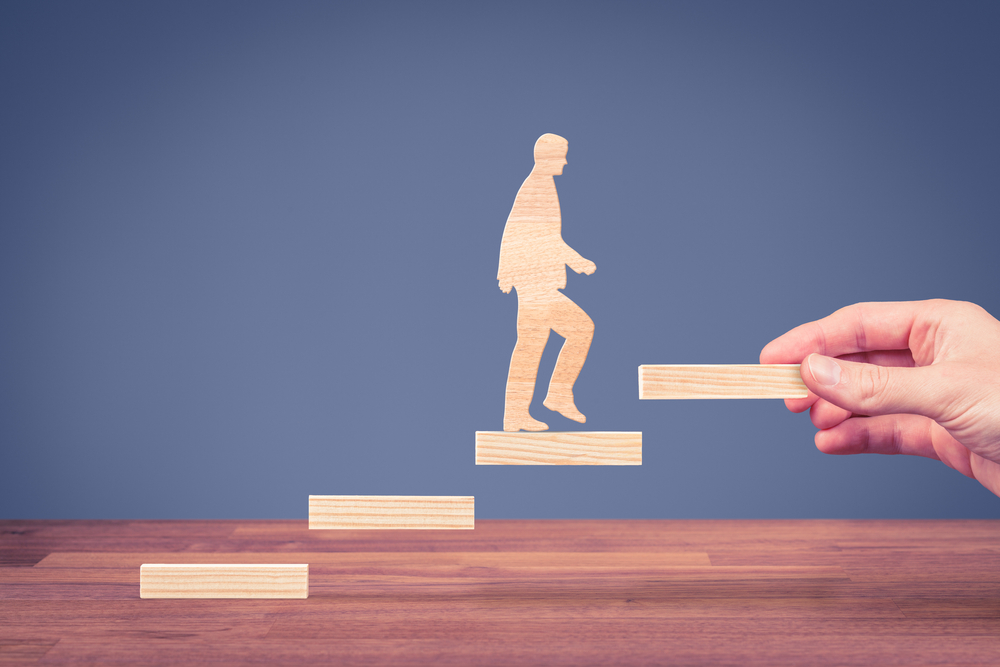The MS Balancing Act: Steady As We Go
Written by |


Gait and balance issues and MS go together like peanut butter and chocolate. At least they do to me.
In one way or another, they’ve been in the foreground of my life since I was diagnosed in 2013. I’ve written about my ups and downs in achieving and maintaining my balance, and it continues to be a focus of mine.
But more and more, I’ve come to think of balance in terms of the lowercase “b” balance and the uppercase version, too.
I’m pretty sure they’re not just related, they’re inseparable.
The small ‘b’
In early February, I read the National Multiple Sclerosis Society’s summary of findings from the 7th International Symposium on Gait and Balance in MS held in early September 2017 in Portland, Oregon. Among the symposium’s presentations and discussions were the positive results shown by a vestibular rehabilitation program called BEEMS (balance and eye movement exercises for persons with MS). Created specifically for people with MS, the BEEMS program “improved balance, dizziness, fatigue, and quality of life in people with multiple sclerosis (MS), researchers reported.”
Gait problems, according to the National Multiple Sclerosis Society, can lead to “concerns about falling and appearing impaired in public.” They also sometimes can lead to social isolation. In other words, gait problems can lead to anxiety. And anxiety, especially among those with MS, is a fairly certain predictor of depression.
And why not?
MS and all of its uncertainties are happy to traffic in anxiety all day long. The increasing lack of our ability to control the steady distribution of our weight while standing or walking — achieving and maintaining physical balance — only highlights that.
The big ‘B’
Then I stumbled across “Tips to Ease Anxiety, an Often Overlooked Effect of MS.” Written by Debi Wilson, the column shares the effects that stress and anxiety were having on her during a very difficult time in her life, along with some tips for coping with them.
Wilson notes an estimated 43 percent of people with MS experience some form of anxiety due to the disease. Citing “Anxiety in MS: Frequently Overlooked and Undetected,” an article from the Multiple Sclerosis Association of America, she writes, “The anxiety relief methods suggested are exercise, thought pattern changes, and the dissection of fearful concerns you have to make them manageable. Also, solving problems that cause fear and dealing with losses by expressing your feelings are important. A therapist can help with that and possibly prescribe anti-anxiety medicines.”
Based in part on cognitive behavioral therapy (CBT), “Anxiety in MS: Frequently Overlooked and Undetected” also states, “Learning to control [emphasis mine] your reactions and quiet yourself can allow you to feel anxiety when needed to problem-solve, but not to become so overwhelmed by it. Increasing the areas of where you can have control and prioritizing activities can also help.”
The tenets of CBT and coping with anxiety seem to me to be philosophically similar to the “Serenity Prayer,” which begins with the phrase, “God grant me the serenity to accept the things I cannot change; courage to change the things I can; and wisdom to know the difference.”
It’s a philosophy that’s at the foundation of a number of coping strategies.
A few months ago, I spoke with a therapist who has MS who suggested to me that “having MS puts us 10 feet closer to everything in life.” Her point was that many of the effects of MS make us prone to experiencing some of the mental/cognitive, emotional, and physical declines that every person inevitably experiences, only faster.
Many of the effects of MS — most, in fact — are out of our control. MS is a troubling combination of unpredictability and certainty: the unpredictability of never quite knowing when and how badly it will trip us up or make us feel out of control coupled with the certainty of knowing that it almost always will. And while often gradual, each little loss, or even the anticipated loss, may make us feel even more out of control, breeding even more anxiety in our lives as a result.
But her other point was that with or without MS, so many things in our lives are always out of our control. Learning to accept that and then focusing on what we can control and change strike me as a powerful benefit and lesson of being 10 feet closer to everything in life, and the balance with the uppercase “b” in MS.
Increasingly, I’m pretty certain it may be the more important one, too.
***
Note: Multiple Sclerosis News Today is strictly a news and information website about the disease. It does not provide medical advice, diagnosis, or treatment. This content is not intended to be a substitute for professional medical advice, diagnosis, or treatment. Always seek the advice of your physician or other qualified health provider with any questions you may have regarding a medical condition. Never disregard professional medical advice or delay in seeking it because of something you have read on this website. The opinions expressed in this column are not those of Multiple Sclerosis News Today or its parent company, Bionews Services, and are intended to spark discussion about issues pertaining to multiple sclerosis.



Ramzi louza
Great articles, opened my eyes on issues I did not comprehend before
Mike Knight
Thanks so much, I am glad it was helpful!
Christopher Paris
Truly an invaluable short essay. I, too, with balance and gait problems due to a lesion on brainstem, and lumbar lesions. I'm sure the brainstem lesion has incorporated the vagus nerve to exacerbate the balancing act and the anxiety syndrome. But, rather than request antidepressants, I turned to meditation, and self-hypnosis with, I'm very pleased to state, very positive results not only in coping, but in relaxing, focusing, and possibly even reversing, to a degree. In addition, I'm reluctant to medicate with drugs that would prove to compromise my quality of life, I simply refuse. I would very much welcome an article or a series of articles by you and your colleagues that address the benefits and rewards of meditation practices and self-hypnosis and their evidences in assisting our demographic's challenges and our unremitting pursuit of enhancing well-being.
Mike Knight
Thanks so much for reading the piece and also the insight into self-hypnosis. I am definitely intrigued and will look into very soon.
Sharilyne
Thank you. I needed this for my experience the last few days. Well-being is important to me. This reminder came at the right time.
Mike Knight
You're sure welcome, Sharilyne, I'm glad this was helpful to you. I think the "mental/emotional" game is at least as hard as the physical one. At least. Thanks again!
Penny Sheppard
Thank you, I am so blessed to read these articles, they do a great job of helping me relate things I am feeling or going through to my MS. I don't feel like I am alone. I do however have difficulty trying to explain to family and friends the issues I am experiencing. I often get the impression they feel like I'm just making excuses because of the "invisible" nature of MS.
Mike Knight
Thank you Penny, and thanks for reading my column. I totally understand what you're saying about others not quite understanding what we are going through (there are certainly people in my life that have been the same). I recently finished another piece (https://wp.me/p4CNKC-bIX) about how to tell friends and family about fatigue in a way that they will better understand since so many people without MS wrongfully associate fatigue with tiredness. I think the short story is to try and find ways to help them "feel" the experience, or at least some of it. Thanks again!
Jean
Thanks Mike for your column and great insight! I will also add to your meditation and self hypnosis my connection to God which always brings me to greater understanding and blessings. We are never alone!
Mike Knight
Thank you so much!
Cynthia King
I have had ms for 25 years. I have gone to Physical Therapy on and off over the years, but this is the first time they focused on balance. You have to be aware that all PT isn’t strength and conditioning, a lot of times you need neurological PT, and you end up in orthopedic PT. Find a neurological practitioner. I notice a difference after two weeks.